2020年人教版英语九年级Unit4知识点总结整理
人教版九年级英语Unit4知识点梳理及语法讲义(教师版)

—What’s he like?他是什么样的人?
—He’s outgoing.他是外向的。
【拓展延伸】
(1)“What does sb. look like?”意为“某人长什么样?”,只能用来提问人的外貌,不能用来提问人的性格、品质等。其中like是介词,意为“像”。
13. examination(n.考试) —examine(v.考试;审查)
14. exactly(adv.确切地)—exact(adj.精确的)
15. pride(n.骄傲;自豪)—proud(adj.自豪的;骄傲的)
16. general(adj.总的;普遍的)—generally(adv.通常地)
【注意】陈述句和附加问句在人称、数和时态上必须保持一致,
且附加问句的主语必须为代词。
【拓展延伸】反意疑问句的答语
(1)反意疑问句的答语应符合事实。事实是肯定的用yes,事实是否定的用no
(2) 当句式是“前否后肯”的结构时,翻译要以事实为依据,yes翻译为“不是”,no翻译为“是的”
►—Sheisa student,isn’tshe?她是一个学生,不是吗?
3. help(n/v.帮助) —helpful(adj.有帮助的)—helpless(adj.没有帮助的)
4. interview(v.采访;面试) —interviewer(n.采访者)
5. Asia(n.亚洲)—Asian()
6. deal(v.对付;对待) —dealt(过去式/过去分词)
7. shy(adj.害羞的) —shyness(n.害羞;腼腆)
【用法详解】
(1)
(2)19yearold意为“19岁的”(重点)
2020人教版九年级英语上Unit4课文重难点讲解与练习
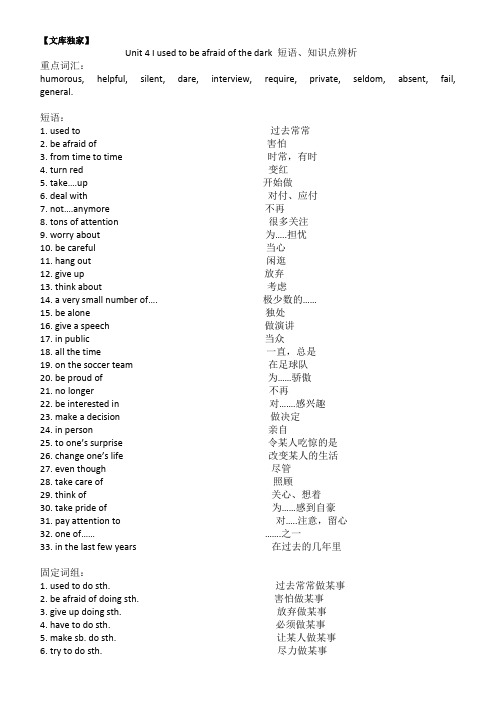
【文库独家】Unit 4 I used to be afraid of the dark 短语、知识点辨析重点词汇:humorous, helpful, silent, dare, interview, require, private, seldom, absent, fail, general.短语:1. used to 过去常常2. be afraid of 害怕3. from time to time 时常,有时4. turn red 变红5. take….up 开始做6. deal with 对付、应付7. not….anymore 不再8. tons of attention 很多关注9. worry about 为…..担忧10. be careful 当心11. hang out 闲逛12. give up 放弃13. think about 考虑14. a very small number of…. 极少数的……15. be alone 独处16. give a speech 做演讲17. in public 当众18. all the time 一直,总是19. on the soccer team 在足球队20. be proud of 为……骄傲21. no longer 不再22. be interested in 对…….感兴趣23. make a decision 做决定24. in person 亲自25. to one’s surprise 令某人吃惊的是26. change one’s life 改变某人的生活27. even though 尽管28. take care of 照顾29. think of 关心、想着30. take pride of 为……感到自豪31. pay attention to 对…..注意,留心32. one of………….之一33. in the last few years 在过去的几年里固定词组:1. used to do sth. 过去常常做某事2. be afraid of doing sth. 害怕做某事3. give up doing sth. 放弃做某事4. have to do sth. 必须做某事5. make sb. do sth. 让某人做某事6. try to do sth. 尽力做某事7. adj. + enough to do sth. 足够……而能做某事8. be prepared to do sth. 准备做某事9. see sb. doing sth. 看见某人在做某事10. take up doing sth. 开始做某事11. begin to do sth. 开始做某事12. require sb. to do sth. 要求某人做某事13. decide to do sth. 决定做某某14. make a decision to do sth. 决定做某事15. It’s hard to believe that……很难相信……….16. It has been + 一段时间+ since + 从句自从……以来已经有很长的时间了17. dare to do sth. 敢于做某事18. It’s + adj. + for sb. + to do sth. 对某人来说做某事是……的重点句型:1. I used to be afraid of the dark. 我过去常常怕黑。
2020-2021学年人教版英语九年级 Unit4 知识点整理

Unit 4知识点P25ed to do sth.过去常常做某事be used to doing sth.习惯于做某事He used to get up late,but now he is used to getting up early.他过去常常起床很迟,但是现在习惯于早起。
I used to be afraid of the dark.我过去害怕黑暗。
ed to do sth.中used 不随主语的变化而变化。
Mario, you used to be short ,didn’t you ? Mario,你过去很矮,不是吗?Yes,I did./No, I didn’t.(依据事实来答)3.What’s sb like ?可用来提问人的相貌,也可用来提问人的性格、品质。
而What does sb look like?只用来提问相貌What’s your math teacher like?既可以回答:He’s tall and thin.也可以说He’s outgoing.What does your sister look like?-She’s of medium build with short hair.她中等身材,留着短发。
P264.humorous adj.有幽默感的、滑稽有趣的serious adj.严肃的;重大的;认真的;严重的5.silent adj.不说话的,沉默的be /keep /stay siltent 保持沉默silently adv. She was always silent in class.她在课堂上总是不说话。
in silence 安静地,无声地He walked into the room in silence.She got good grades in silence.她默默地取得了好成绩。
6.helpful adj. 有帮助的;有用的a helpful suggestion 一条有用的建议be helpful to sb. 对某人有用a helpful child 一个乐于助人的小孩7.from time to time 时常;有时=sometimes =at timesShe still plays the piano from time to time.=At times she still plays the piano.8.such /so①such+a/an+adj.+n.(单数)=so+adj.+a/an+n.(单数)such a nice coat=so nice a coatsuch a happy childhood 如此快乐的一段童年时光①such +adj.+n.(pl.)/不可数名词such nice coats①so many/much/little /fewso many mistakes 这么多错误such a great idea 如此好的一个主意=so great a idea9.It’s been three years since we last saw our primary school classmates.自从上次我们小学同学见面已经三年了。
人教版九年级英语u4知识点

人教版九年级英语u4知识点Unit 4: Our WorldIntroduction:In the ninth grade English curriculum, Unit 4 revolves around expanding students' knowledge about the world around them. The unit covers various topics, including environmental issues, cultural diversity, global communication, and scientific advancements. By exploring these areas, students will not only enhance their English language skills but also broaden their perspectives on the world.Environmental Issues:One of the focal points of Unit 4 is environmental issues. Students learn about the pressing problems our planet faces, such as pollution, deforestation, and climate change. They are encouraged to think critically about the causes and consequences of these issues and explore possible solutions. Through this discussion, students develop a sense of responsibility towards the environment and learn how their actions can contribute to preserving it.Cultural Diversity:Another significant aspect of Unit 4 is cultural diversity. Students investigate different cultures, traditions, and customs from around the world. This exploration helps them appreciate the rich and diverse tapestry of humanity. They learn about festivals, music, art, and clothing, gaining a better understanding of cultural uniqueness and promoting tolerance and acceptance.Global Communication:Unit 4 also emphasizes the importance of global communication in today's interconnected world. Students explore various means of communication, such as social media, email, and video conferencing. They discuss the advantages and challenges of communicating across cultural and linguistic barriers. By learning effective communication skills, students can bridge cultural gaps and foster meaningful connections with people from different backgrounds.Scientific Advancements:Lastly, Unit 4 introduces students to significant scientific advancements that have shaped our world. They learn about breakthroughs in fields like medicine, technology, and space exploration. By understanding these advancements, students realize the immense potential of scientific discovery in solving global challengesand improving lives. They are encouraged to develop an interest in scientific exploration and possibly pursue careers in scientific research.Conclusion:Unit 4 of the ninth grade English curriculum offers students a comprehensive understanding of the world they inhabit. By covering environmental issues, cultural diversity, global communication, and scientific advancements, students gain knowledge that extends beyond the boundaries of their textbooks. They develop a sense of global citizenship, empathy towards others, and critical thinking skills necessary to thrive in an increasingly interconnected world. Through this unit, students broaden their horizons and become more open-minded individuals who are aware of the challenges and opportunities our world holds.。
最全面人教版九年级英语全册第四单元知识点归纳总结
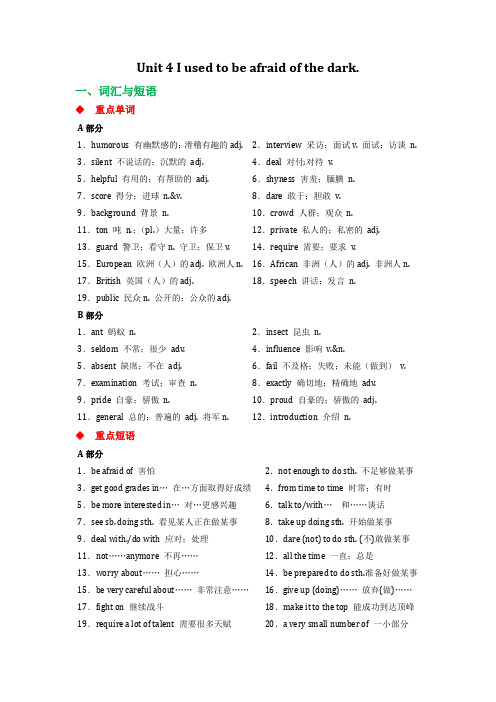
Unit 4 I used to be afraid of the dark.一、词汇与短语◆重点单词A部分1.humorous 有幽默感的;滑稽有趣的adj.2.interview 采访;面试v. 面试;访谈n. 3.silent 不说话的;沉默的adj.4.deal 对付;对待v.5.helpful 有用的;有帮助的adj.6.shyness 害羞;腼腆n.7.score 得分;进球n.&v.8.dare 敢于;胆敢v. 9.background 背景n.10.crowd 人群;观众n.11.ton 吨n.;(pl.)大量;许多12.private 私人的;私密的adj. 13.guard 警卫;看守n. 守卫;保卫v.14.require 需要;要求v. 15.European 欧洲(人)的adj. 欧洲人n.16.African 非洲(人)的adj. 非洲人n. 17.British 英国(人)的adj.18.speech 讲话;发言n.19.public 民众n. 公开的;公众的adj.B部分1.ant 蚂蚁n.2.insect 昆虫n.3.seldom 不常;很少adv.4.influence 影响v.&n.5.absent 缺席;不在adj.6.fail 不及格;失败;未能(做到)v. 7.examination 考试;审查n.8.exactly 确切地;精确地adv. 9.pride 自豪;骄傲n.10.proud 自豪的;骄傲的adj. 11.general 总的;普遍的adj. 将军n.12.introduction 介绍n.◆重点短语A部分1.be afraid of 害怕2.not enough to do sth. 不足够做某事3.get good grades in…在…方面取得好成绩4.from time to time 时常;有时5.be more interested in…对…更感兴趣6.talk to/with…和……谈话7.see sb. doing sth. 看见某人正在做某事8.take up doing sth. 开始做某事9.deal with./do with 应对;处理10.dare (not) to do sth. (不)敢做某事11.not……anymore 不再……12.all the time 一直;总是13.worry about……担心……14.be prepared to do sth.准备好做某事15.be very careful about……非常注意……16.give up (doing)……放弃(做)……17.fight on 继续战斗18.make it to the top 能成功到达顶峰19.require a lot of talent 需要很多天赋20.a very small number of 一小部分21.eat a lot of vegetables 吃大量的蔬菜22.listen to pop music 听流行音乐23.watch scary movies 看恐怖片24.at least 至少25.in public公开地;在别人(尤指生人)面前26.tons of许多的;大量27.give a speech 做演讲28.a number of许多;大量B部分1.make a decision做决定2.in person亲身;亲自3.even though即使;尽管4.take care of 照顾;照料5.be absent from 缺席;不在6.paint pictures 画画7.take pride in…为…感到自豪8.music classes 音乐课9.be proud of…为…骄傲;感到自豪10.on the soccer team 在足球队11.do well in……在……方面做得好12.work hard 学习努力13.make friends with sb. 和某人交朋友14.take care of/look after 照顾15.move to……搬到……16.feel lonely 感到孤独17.be absent from classes 旷课18.a boarding school 一所寄宿学校19.fail the exams/examinations 考试不及格20.advise sb. to do sth.建议某人做某事21.send…to…派……到……;送……到……22.look for 寻找23.have a great influence on sb. 对某人有很大影响◆重点句子A部分1.Mario, you used to be short, didn't you? 马里奥,你过去很矮,不是吗?2.It's been three years since we last saw our primary school classmates.我们上次见到小学同学已经三年了。
人教版九年级全一册英语Unit4单元语法知识点总结
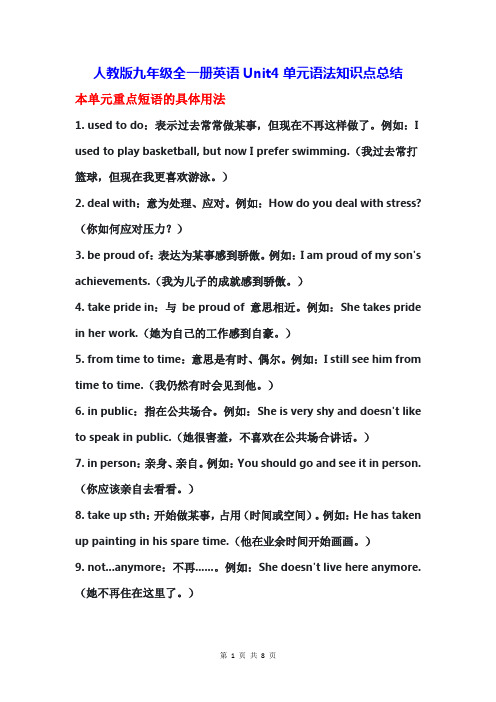
人教版九年级全一册英语Unit4单元语法知识点总结本单元重点短语的具体用法1. used to do:表示过去常常做某事,但现在不再这样做了。
例如:I used to play basketball, but now I prefer swimming.(我过去常打篮球,但现在我更喜欢游泳。
)2. deal with:意为处理、应对。
例如:How do you deal with stress?(你如何应对压力?)3. be proud of:表达为某事感到骄傲。
例如:I am proud of my son's achievements.(我为儿子的成就感到骄傲。
)4. take pride in:与be proud of 意思相近。
例如:She takes pride in her work.(她为自己的工作感到自豪。
)5. from time to time:意思是有时、偶尔。
例如:I still see him from time to time.(我仍然有时会见到他。
)6. in public:指在公共场合。
例如:She is very shy and doesn't like to speak in public.(她很害羞,不喜欢在公共场合讲话。
)7. in person:亲身、亲自。
例如:You should go and see it in person.(你应该亲自去看看。
)8. take up sth:开始做某事,占用(时间或空间)。
例如:He has taken up painting in his spare time.(他在业余时间开始画画。
)9. not...anymore:不再......。
例如:She doesn't live here anymore.(她不再住在这里了。
)10. worry about:担心、担忧。
例如:Don't worry about the exam, just do your best.(不要担心考试,尽力就好。
人教版九年级英语unit4知识点

九年级unit4知识点1.humor n. 幽默humorous adj. 有幽默感的,有趣儿的2. silent adj. 不说话的,沉默的keep silent,保持沉默silence n. 沉默,无声in silence 沉默,无声3. helpful adj. 有用的,有帮助的be helpful to sb 对某人有帮助eg: The book is helpful to the students.4. from time to time 时常, 有时= sometimes = at times5. Asian adj. 亚洲的, 亚洲人的, 亚洲人Asia n. 亚洲6. deal with = do with (deal with用how提问,do with 用what提问)7. shy adj. 害羞的shyness n. 害羞,腼腆8. dare to do sth 敢于做某事eg: We must dare to think speak and act.9. crowd n. 人群, 观众crowded adj. 拥挤的uncrowded adj. 不拥挤的, 人少的10. tons of 许多的,大量的= lots of= a lot of= a number ofeg: She gets tons of male every day.11. private adj. 私人的, 秘密的= personal12. require sb to do sth 要求某人做某事eg: The teacher required the students to be quiet.13. Europe n. 欧洲European adj. 欧州的,欧洲人的, 欧洲人14. Africa n. 非洲African adj. 非洲的, 非洲人的, 非洲人15. give a speech 演说, 演讲eg: They invited him to give a speech.16. in public 公开地eg: It's impolite to speak loudly in public.17. influence v. influnce sb to do sth 影响某人使其做某事influence n. 影响have an influence on sb 对人有影响eg: His idea had a great influence on me.18. be absent from 缺席eg: They were absent from work that day.absent adj. absence n.19. fail to do 未能做某事eg: I failed to pass the driving test.20. in person 亲身, 亲自21. be proud of = take pride in 为...自豪, 感到骄傲。
人教版九年级英语unit4语法知识点

人教版九年级英语unit4语法知识点人教版九年级英语Unit 4语法知识点在英语学习中,语法是非常重要的一部分。
掌握语法知识可以帮助我们正确理解和运用英语。
本文将介绍人教版九年级英语Unit 4的语法知识点,帮助大家更好地学习和应用。
一、现在完成时现在完成时用来表示过去发生的动作对现在的影响或结果。
它的结构是主语 + have/has + 过去分词。
例句:1. I have finished my homework.(我已经完成作业。
)2. He has gone to the supermarket.(他已经去超市了。
)我们可以使用现在完成时来描述过去发生的事情对当前状态的影响。
比如 "I have lost my key."(我丢了我的钥匙)表示我现在没有钥匙。
二、情态动词情态动词用来表示说话者对某个动作或状态的态度、可能性、允许性等。
常见的情态动词有 can, could, may, might(可以)、must(必须)、shall, should(应该)、will, would, need等。
例句:1. You can go to the party.(你可以去参加派对。
)2. He must finish his homework before playing games.(他必须先做完作业再玩游戏。
)情态动词有一些特点:后面接动词原形,表示客观的态度或可能性;情态动词本身没有人称和数的变化;句子中情态动词和动词基本形的变化最小。
三、虚拟语气虚拟语气用来表示非真实或假设的情况。
在条件从句中,用虚拟语气来表示可能不会实现的愿望、假设或建议等。
常见的虚拟语气形式有:would/could/might +动词原形。
例句:1. If I were a bird, I would fly in the sky.(如果我是一只鸟,我会在天空飞翔。
)2. I wish I could go with you.(我希望我能和你一起去。
人教版九年级英语unit4知识点总结

Unit41.过去常常做。
used to do sth 其否定和疑问借助助动词did)习惯做某事be/get used to doing sth2.It’s / has been +时间段+since+一般过去时态句子“自从。
已经有多长时间了。
”It’s / It has been three years since we last saw her.3.from time to time 时不时地;有时(=sometimes)4.not…+形/副+enough+ to do sth 不够。
不能做。
She was never brave enough to ask questions.5.get good grades in .. 在。
(方面)取得好成绩6.(be) on a swim team 加入游泳队7.be (more) interested in…. 对。
(更)感兴趣8.I used to be afraid of the dark.我过去害怕黑暗。
9. be alone 独处;alone (副词)单独;独自•feel lonely 感到孤独lonely(形容词)孤独的10. give a speech in public 在公共场所演讲11. on 关于12.at least +数词至少13.worry about…= be worried about …担心14. all the time一直;始终15.be/feel nervous about “对……感到紧张”16.such+(a/an)+形容词+名词(一个)如此。
的。
such a beautiful girl 一个如此漂亮的女孩so+形/副so many flowers, so much water.17.see sb. doing sth 看见某人正在做某事18.Score可数名词:得分,进球get good scores in / on…动词:得分,进球19. turn red / yellow20. an ant / an insect / a European country21.19岁的19-year-old 数词-单数名词“。
人教版英语九年级Unit4单元知识点归纳
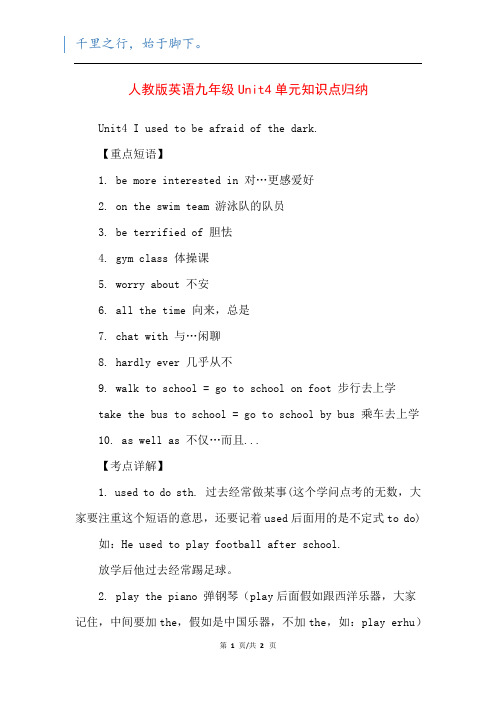
人教版英语九年级Unit4单元知识点归纳
Unit4 I used to be afraid of the dark.
【重点短语】
1. be more interested in 对…更感爱好
2. on the swim team 游泳队的队员
3. be terrified of 胆怯
4. gym class 体操课
5. worry about 不安
6. all the time 向来,总是
7. chat with 与…闲聊
8. hardly ever 几乎从不
9. walk to school = go to school on foot 步行去上学
take the bus to school = go to school by bus 乘车去上学
10. as well as 不仅…而且...
【考点详解】
1. used to do sth. 过去经常做某事(这个学问点考的无数,大家要注重这个短语的意思,还要记着used后面用的是不定式to do) 如:He used to play football after school.
放学后他过去经常踢足球。
2. play the piano 弹钢琴(play后面假如跟西洋乐器,大家
记住,中间要加the,假如是中国乐器,不加the,如:play erhu)。
初中英语 人教版 九年级全一册 Unit 4 知识点
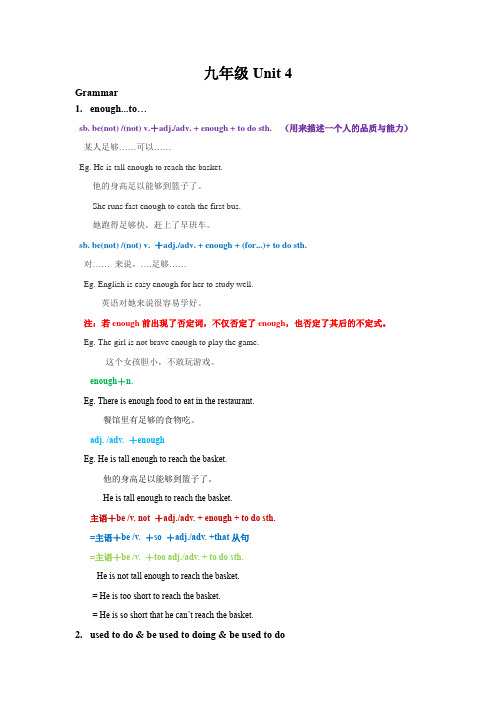
九年级Unit 4Grammar1.enough...to…sb. be(not) /(not) v.+adj./adv. + enough + to do sth. (用来描述一个人的品质与能力)某人足够……可以……Eg. He is tall enough to reach the basket.他的身高足以能够到篮子了。
She runs fast enough to catch the first bus.她跑得足够快,赶上了早班车。
sb. be(not) /(not) v. +adj./adv. + enough + (for...)+ to do sth.对…… 来说,….足够……Eg. English is easy enough for her to study well.英语对她来说很容易学好。
注:若enough前出现了否定词,不仅否定了enough,也否定了其后的不定式。
Eg. The girl is not brave enough to play the game.这个女孩胆小,不敢玩游戏。
enough+n.Eg. There is enough food to eat in the restaurant.餐馆里有足够的食物吃。
adj. /adv. +enoughEg. He is tall enough to reach the basket.他的身高足以能够到篮子了。
He is tall enough to reach the basket.主语+be /v. not +adj./adv.+ enough+ to do sth.=主语+be /v. +so +adj./adv.+that从句=主语+be /v. +too adj./adv.+ to do sth.He is not tall enough to reach the basket.= He is too short to reach the basket.= He is so short that he can’t reach the basket.ed to do & be used to doing & be used to doused to do sth. 过去常常做某事(现在不做了)主语适用于各种人称。
人教版英语九年级Unit4单元知识点归纳

人教版英语九年级Unit4单元知识点归纳Unit 4: I Used to Be Afraid of the DarkWhen I was younger。
I used to be afraid of the dark。
Iwould always worry about what was XXX were under my bed orin my closet。
I would always sleep with a XXX.Despite my fear of the dark。
I was on the swim team and loved being in the water。
I also enjoyed gym class and being active。
I was more interested in sports than in reading or watching TV.I hardly ever walked to school。
I would always take the bus。
even though my school was not far from my house。
I would chat with my friends on the bus ride to school.As I got older。
my fear of the dark slowly went away。
I realized that there was nothing to be afraid of and that the dark wasjust a natural part of life。
Now。
I can sleep without a nightlight and am not afraid of the dark anymore.Looking back。
I realize that my fear of the dark was just a phase that I went through。
人教九年级英语unit4知识点

人教九年级英语unit4知识点Unit 4 Knowledge Points in Ninth Grade English TextbookAs ninth-grade students studying the English language, it is important for us to grasp the knowledge points within each unit. In this article, we will explore the key concepts and information covered in Unit 4 of our textbook. Let's dive in!1. Vocabulary Expansion:Unit 4 introduces us to a range of new vocabulary words, allowing us to expand our language skills. These words include "ambition," "athlete," "boundary," "duty," and "status." It is crucial to understand the meaning and usage of these words, as they will greatly enhance our comprehension and communication abilities.2. Grammar Excursion:One essential grammar concept covered in this unit is the past simple and past continuous tense. It is crucial to differentiate between the two and understand when to use each one. While the past simple tense refers to a completed action in the past, the past continuous tense emphasizes an ongoing action or an interrupted action in the past. Mastering this grammar point will provide us with the foundation toconstruct accurate and coherent sentences when discussing events or actions in the past.3. Reading Comprehension:Unit 4 revolves around the theme of ambition and success. Through various reading passages, we are exposed to inspiring stories of individuals who have overcome challenges to achieve their dreams. These passages not only improve our reading skills but also broaden our horizons by introducing us to different perspectives and experiences.4. Listening Practice:In Unit 4, we are given the opportunity to practice our listening skills through audio recordings. These recordings cover a range of topics related to ambition and success. By listening carefully and following the instructions, we can improve our ability to comprehend spoken English and sharpen our listening comprehension skills. Remember to take notes and pay attention to details while listening to the recordings.5. Writing Development:Unit 4 also encourages us to develop our writing skills. We are provided with writing tasks that allow us to express our ideas, opinions, and personal experiences. Through these activities, we can enhance our ability to communicate effectively in writing, employing proper grammatical structures and appropriate vocabulary.6. Cultural Insights:In addition to language skills, Unit 4 provides us with insights into different cultures. By exploring the stories and experiences of individuals from various backgrounds, we can develop a better understanding and appreciation for diversity. This cultural awareness not only broadens our knowledge but also promotes empathy and understanding towards others.7. Critical Thinking:Unit 4 challenges us to think critically and analyze the content we encounter. Through discussion questions and reflection activities, we are prompted to evaluate various aspects of ambition, success, and the pursuit of dreams. These exercises encourage us to develop our analytical skills and think beyond the surface level, fostering a deeper understanding of the topics covered.In conclusion, Unit 4 of our ninth-grade English textbook offers a wide range of knowledge points that are crucial to our language development. From vocabulary expansion to grammar exercises, reading comprehension to listening practice, writing development, cultural insights, and critical thinking, this unit provides a comprehensive learning experience. By dedicating ourselves to understanding and mastering these concepts, we can enhance our English language skills and cultivate a broader perspective on the world around us.。
2020人教版九年级英语上Unit4重点知识梳理_短语归纳
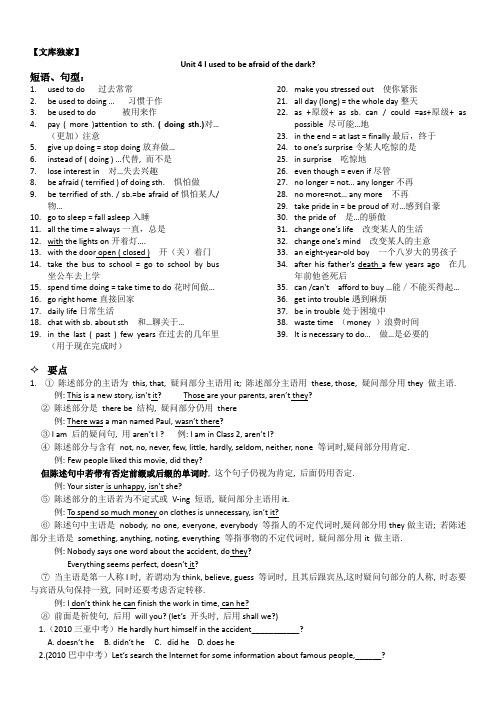
【文库独家】Unit 4 I used to be afraid of the dark? 短语、句型:ed to do 过去常常2.be used to doing … 习惯于作3.be used to do 被用来作4.pay ( more )attention to sth. ( doing sth.)对…(更加)注意5.give up doing = stop doing放弃做…6.instead of ( doing ) …代替, 而不是7.lose interest in 对…失去兴趣8.be afraid ( terrified ) of doing sth. 惧怕做9.be terrified of sth. / sb.=be afraid of惧怕某人/物…10.go to sleep = fall asleep入睡11.all the time = always一直,总是12.with the lights on开着灯….13.with the door open ( closed ) 开(关)着门14.take the bus to school = go to school by bus坐公车去上学15.spend time doing = take time to do花时间做…16.go right home直接回家17.daily life日常生活18.chat with sb. about sth 和…聊关于…19.in the last ( past ) few years在过去的几年里(用于现在完成时)20.make you stressed out 使你紧张21.all day (long) = the whole day整天22.as +原级+ as sb. can / could =as+原级+ aspossible 尽可能…地23.in the end = at last = finally最后,终于24.to one’s surprise令某人吃惊的是25.in surprise 吃惊地26.even though = even if尽管27.no longer = not… any longer不再28.no more=not… any more 不再29.take pride in = be proud of对…感到自豪30.the pride of 是…的骄傲31.change one’s life 改变某人的生活32.change one’s mind 改变某人的主意33.an eight-year-old boy 一个八岁大的男孩子34.after his father's death a few years ago 在几年前他爸死后35.can /can't afford to buy …能/不能买得起…36.get into trouble遇到麻烦37.be in trouble处于困境中38.waste time (money )浪费时间39.It is necessar y to do… 做…是必要的要点1. ①陈述部分的主语为this, that, 疑问部分主语用it; 陈述部分主语用these, those, 疑问部分用they 做主语.例: This is a new story, isn’t it? Those are your parents, aren’t they?②陈述部分是there be 结构, 疑问部分仍用there例: There was a man named Paul, wasn’t there?③ I am 后的疑问句, 用aren’t I ? 例: I am in Class 2, aren’t I?④陈述部分与含有not, no, never, few, little, hardly, seldom, neither, none 等词时,疑问部分用肯定.例: Few people liked this movie, did they?但陈述句中若带有否定前缀或后缀的单词时, 这个句子仍视为肯定, 后面仍用否定.例: Your sister is unhappy, isn’t she?⑤陈述部分的主语若为不定式或V-ing 短语, 疑问部分主语用it.例: To spend so much money on clothes is unnecessary, isn’t it?⑥陈述句中主语是nobody, no one, everyone, everybody 等指人的不定代词时,疑问部分用they做主语; 若陈述部分主语是something, anything, noting, everything 等指事物的不定代词时, 疑问部分用it 做主语.例: Nobody says one word about the accident, do they?Everything seems perfect, doesn’t it?⑦当主语是第一人称I时, 若谓动为think, believe, guess 等词时, 且其后跟宾丛,这时疑问句部分的人称, 时态要与宾语从句保持一致, 同时还要考虑否定转移.例: I don’t think he can finish the work in time, can he?⑧前面是祈使句, 后用will you? (le t’s 开头时, 后用shall we?)1.(2010三亚中考)He hardly hurt himself in the accident___________?A. doesn‘t heB. didn‘t heC. did heD. does he2.(2010巴中中考)Let‘s search the Internet for some information about famous people,______?A. will youB. won‘t youC. shall we3.(2013苏州市)Eric‘s never seen a three-D movie at the cinema,_______?A.hasn‘t he B.has he C.isn‘t he D.is he4.-(2010兰州市)--He didn‘t go to the meeting this morning, did he? ----______. Though he was not feeling very well.A. No, he didn‘t.B. Yes, he did.C. No, he did.D. Yes, he didn‘t.5. (2010常州市)—He‘s already back to Australia, _________? — _________. He is on a visit to Shanghai.A. isn‘t he; NoB. hasn‘t he; YesC. isn‘t he; YesD. hasn‘t he; No6. (2010娄底中考) —She doesn‘t like geography, does she? — _________.A. Yes, she doesB. Yes, she doesn‘tC. No, she does7. (2010绥化中考) He‘s flown to Hainan for a holiday, _______ he? A. isn‘t B. hasn‘t C. wasn‘t8. ---- Let‘s go skating,_______? --- OK. Let‘s go. (2010湖北十堰市)A. do youB. don‘t youC. will youD. shall we9. (2013·滨州中考) –There is little milk in the milk bag, ________ there?A. isB. isn‘tC. aren‘tD. are10. (2009·孝感中考) Bob, you watched the fashion show last night, ________?A. weren‘t youB. didn‘t youC. haven‘t youD. won‘t you2. used to do sth. 过去常常做某事否定形式:didn’t use to do sth. / used not to do sth.如:He used to play football after school. 放学后他过去常常踢足球。
人教版丨九年级英语4单元必记知识点

人教版丨九年级英语4单元必记知识点Unit4 I used to be afraid of the dark.【重点短语】1. be more interested in 对…更感兴趣2. on the swim team 游泳队的队员3. be terrified of 害怕4. gym class 体操课5. worry about 担心6. all the time 一直,总是7. chat with 与…闲聊8. hardly ever 几乎从不9. walk to school = go to school on foot 步行去上学take the bus to school = go to school by bus 乘车去上学10. as well as 不仅…而且...【考点详解】1. used to do sth. 过去常常做某事(这个知识点考的很多,大家要注意这个短语的意思,还要记着used后面用的是不定式to do)如:He used to play football after school.放学后他过去常常踢足球。
2. play the piano 弹钢琴(play后面如果跟西洋乐器,大家记住,中间要加the,如果是中国乐器,不加the,如:play erhu)3. ①be interested in sth. 对…感兴趣②be interested in doing sth. 对做…感兴趣(对于这两个用法大家一定要掌握,切记切记)如:He is interested in math, but he isn't interested in speaking English. 他对数学感兴趣,但是他对说英语不感兴趣。
4. interested adj. 感兴趣的,指人对某事物感兴趣,往往主语是人interesting adj.有趣的,指某事物/某人具有趣味,主语往往是物(对于interested和interesting要区分清楚,一个主语往往是人,一个主语往往是物)5. be terrified of sth. 害怕……如:I am terrified of the dog.be terrified of doing sth. 害怕做……如:I am terrified of speaking.6. spend 动词,表示“花费金钱、时间”(spend和pay for它们的主语都是人,这一点大家要清楚)①spend…on sth. 在某事上花费(金钱、时间)(重要考点)②spend…(in)doing sth. 花费(金钱、时间)去做某事(重要考点,尤其要注意动名词,也就是动词的ing形式)如:He spends too much time on clothes. 他花费太多的时间在衣着上。
人教版九年级英语全册Unit4知识点

人教版九年级英语全册Unit4知识点一、常用短语ed to do过去常常做2.deal with对付应付3.be proud of为什么骄傲,感到自豪4.take pride in为什么感到自豪5.from time to time时常,有时6.in public公开地7.in person亲身,亲自8.take up sth开始做,接受,占用9.not…anymore不再10.worry about为什么担忧11.hang out闲逛12.think about 考虑13.be alone独处14.on the soccer team在足球队15.no longer不再16.make a decision做决定17.to one’s surprise令某人吃惊的是18.even though尽管19.pay attention to注意,留心20.in the last few years在过去的几年里21.be afraid of害怕22.turn red变红23.tons of attention很多关注24.be careful当心25.give up放弃26.a very small number of极少数的27.give a speech作演讲28.all the time一直总是29.be interested in对什么感兴趣30.change one’s life改变某人的生活31.take care of照顾32.one of…之一二、短语用法集锦ed to do sth过去常常做某2.be afraid of doing sth害怕做某事3.have to do sth必须做某事4.make sb do sth让某人做某事5.give up doing sth放弃做什么6.try to do sth尽力做某事7.adj+ enough to do sth足够…而能够做某事8.be prepared to do sth准备做某事9.see sb doing sth看见某人在做某事10.begin to so sth开始做某事11require sb to do sth要求某人做某事12.decide to do决定做某事13.make a decision to do sth决定做某事14.It’s hard to believe that很难相信15.It +has +been +一段时间+ since+从句自从…以来已经有很多长时间了16.dare to do sth敢于做某事17. take up doing sth开始做某事18. It’s adj.+ for sb.+ to do sth对某人来说做某三、重点语法1. 辨析:used to do sth过去常常做get/be used to sth/doing sth习惯于…be used to do被用于做(被动语态)be used by由(被)…使用(被动语态)be used as被当做…使用(被动语态)be used for doing被用于做(被动语态)例: I used to go to work by bus. Now I take a taxi.He used to be a problem boy. She used to be very shy.I’m used to drinking a cup of water after meal.He’s been used to living in the dormitory.A hammer is used to drive nails.This machine is used to clean the floor.The girl is being used as a servant in the house.A knife can be used for cutting bread.2) afford(支付得起)的用法afford sth买得起…afford to do sth有足够的…去做例:His mother couldn’t afford to pay for her child’s education.They did not consider whether they could afford the time or not.We can’t afford to pay such a price.(such和so区别见P110)3) take pride in sth./ sb. = be proud of sth./ sb为…感到自豪例:He was watching me and take pride in everything good I do.I take pride in my child. =I’m proud of my child.注:He take pride in everything good I do. 这是一个定语从句。
2020秋人教版英语九年级Unit4Iusedtobeafraidofthedark.知识点总结
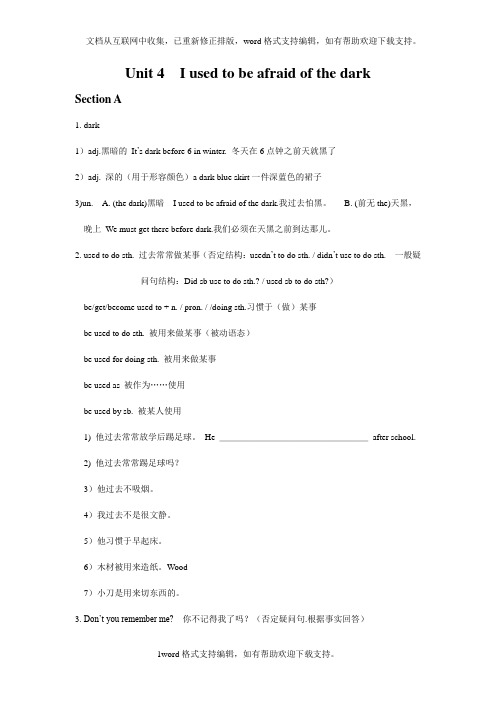
Unit 4 I used to be afraid of the dark Section A1. dark1)adj.黑暗的It’s dark before 6 in winter. 冬天在6点钟之前天就黑了2)adj. 深的(用于形容颜色)a dark blue skirt一件深蓝色的裙子3)un. A. (the dark)黑暗I used to be afraid of the dark.我过去怕黑。
B. (前无the)天黑,晚上We must get there before dark.我们必须在天黑之前到达那儿。
2. used to do sth. 过去常常做某事(否定结构:usedn’t to do sth. / didn’t use to do sth. 一般疑问句结构:Did sb use to do sth.? / used sb to do sth?)be/get/become used to + n. / pron. / /doing sth.习惯于(做)某事be used to do sth. 被用来做某事(被动语态)be used for doing sth. 被用来做某事be used as 被作为……使用be used by sb. 被某人使用1) 他过去常常放学后踢足球。
He _________________after school.2) 他过去常常踢足球吗?3)他过去不吸烟。
4)我过去不是很文静。
5)他习惯于早起床。
6)木材被用来造纸。
Wood7)小刀是用来切东西的。
3. Don’t you remember me? 你不记得我了吗?(否定疑问句.根据事实回答)Yes, I do. 不, 我记得. No, I don’t 是的, 我不记得了4. wait a minute 等一等5. be more interested in 对…更感兴趣.6. be on the swim team = be a member of the swim team 在游泳队效力(是游泳队队员)7. sure1) adj.“确信的,确实的,一定……的”①be sure of sth确信某事②be sure+that从句:确信……③be sure to do sth必定会做某事2) adv ①无疑,确实②好,当然,没问题(用于应答)A.他深信自己会成功。
人教版九年全一册Unit4 I used to be afraid 知识点总结(含短语句型精讲作文)
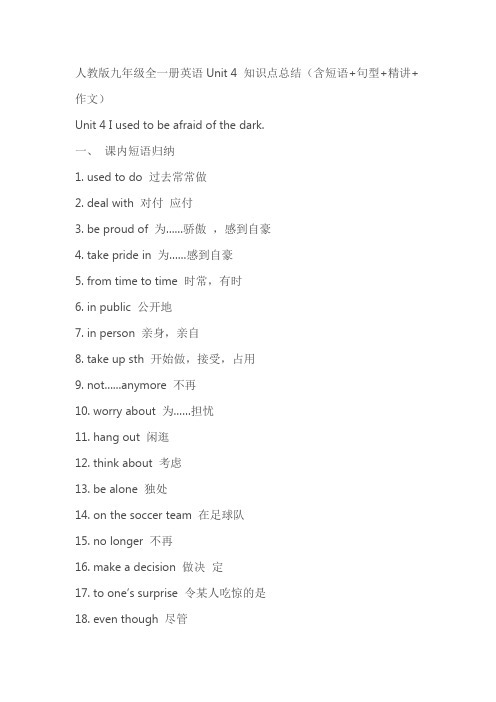
人教版九年级全一册英语Unit 4 知识点总结(含短语+句型+精讲+作文)Unit 4 I used to be afraid of the dark.一、课内短语归纳1. used to do 过去常常做2. deal with 对付应付3. be proud of 为……骄傲,感到自豪4. take pride in 为……感到自豪5. from time to time 时常,有时6. in public 公开地7. in person 亲身,亲自8. take up sth 开始做,接受,占用9. not……anymore 不再10. worry about 为……担忧11. hang out 闲逛12. think about 考虑13. be alone 独处14. on the soccer team 在足球队15. no longer 不再16. make a decision 做决定17. to one’s surprise 令某人吃惊的是18. even though 尽管19. pay attention to 对……注意,留心20. in the last few years 在过去的几年里21. be afraid of 害怕22. turn red 变红23. tons of attention 很多关注24. be careful 当心25. give up 放弃26. a very small number of …极少数的……27. give a speech 作演讲28. all the time 一直总是29. be interested in 对……感兴趣30. change one’s li fe 改变某人的生活31. take care of 照顾32. one of… ……之一二、重点词汇解析1. silentsilent是形容词,意为“沉默的;无言的”,其名词形式为silence。
人教版九年级英语U4_I_used_to_be_afraid_of_the_dark重点知识精炼总结

2019-2020学年人教版九年级英语Unit4 I used to be afraid of the dark.重点知识精炼讲解重点短语1. used to do sth过去常做某事(人) be used to doing习惯于做某事be used to do 用来做事=be used for doing(被动语态)2. in public公开地3. from time to time时常,有时=at times =sometimes 4. give a speech做演讲(gave) 5. deal with处理(dealt) how to deal with=what to do with It’s a deal.就这么定了!6. tons of 许多的,大量的=plenty of7. be able to / can能,会8. in person 亲自9. look after=take care of 照顾,照料10. fail an examination考试不及格11. not...anymore= no more/ not....any longer=no longer不再fight on继续奋斗(fought)12. all the time= always 一直13. a number of= a lot of=lots of 许多,大量14. be on the soccer team 加入足球队15. be absent from.......缺席=miss16. be proud of / take pride in 以.......为荣17. be nervous about担心.......17. be there for their children和孩子们在一起18. 15-year-old 15岁的20. cause problems 引起麻烦=get into trouble 21. to one’s surprise令某人谅讶的是22. make a decision=decide (to do) 决定23. change=influence影响【重点句子】1. I used to be afraid of the dark. 我过去常常前害怕黑暗.2.I go to sleep with my bedroom light on. 我开着卧室的灯睡觉.3. I used to spend a lot of time playing games with my friends. 以前我常常花很多时间和我的朋友们玩游戏.4. I hardly ever have time for concerts. 我几乎没有时间去听音乐会.5. My lif e has changed a lot in the last few years.6. It will make you stressed out. 那会使你紧张的.7. It seems that Yu Mei has changed a lot. 玉梅似乎变化很大.【单元知识点】1. used to do sth. 过去常常做某事(这个知识点考的很多,大家要注意这个短语的意思,还要记着used后面用的是不定式to do)如:He used to play football after school. 放学后他过去常常踢足球。
- 1、下载文档前请自行甄别文档内容的完整性,平台不提供额外的编辑、内容补充、找答案等附加服务。
- 2、"仅部分预览"的文档,不可在线预览部分如存在完整性等问题,可反馈申请退款(可完整预览的文档不适用该条件!)。
- 3、如文档侵犯您的权益,请联系客服反馈,我们会尽快为您处理(人工客服工作时间:9:00-18:30)。
2020年人教版英语九年级Unit 4 I used to be afraid of the dark.语法used to 的用法1.“used to do sth”意为“过去常常做某事”,表示过去的习惯动作或状态,现在/已不发生或不存在。
She used to be thin,but now she is fat.The young man used to wear glasses,but now he doesn’t wear glasses.2.带used to的句子的各种句式的构成:(1)肯定句的构成是:主语+ used to do sth.—He used to play basketball after school.(2)否定句的构成是:主语+ didn’t use to do sth.She didn’t use to have long hair.(3)一般疑问句构成是: Did+主语+use to do sth肯定回答是:Yes,主语+did#否定回答是:No,主语+didn’tDid he use to play the piano Yes,he did/ No,he didn’t(4)反意疑问句的构成是:didn’t+主语She used to be very thin, didn’t she3.妙用异同#(1)used to do sth.表示过去习惯性的动作或经常性的状态.He used to smoke,didn’t he(2)be used to doing sth表示“习惯于做某事”My parents are used to getting up early.(3)be used to do sth=be used for doing sth是被动结构,表示“被用来做某事”%The knives are used to cut things.=The knives are used for cutting things. (1)—Wow! You look different! You wear glasses.—Yes,I did. But now I am wearing contact lenses(隐形眼镜)B. must to(2) When I was a child, I used to ___________ strawberry.]A. likingB. likeC. likedD. likes(3)___________ study in Middle SchoolA. Did you used toB. Did you use toC. Do you used toD. Do you use to(4)She used to with her parents, but now she is used to___with her classmatesat school.A. live; living ; live ; living ; live(5)Mother used to grow flowers in her garden.(改为否定句)Mother grow flowers in her garden."(6)The little girl often wore a skirt in the past.(同义句)The little girl a skirt.(7)You used to be very strong, (完成反意疑问句)反意疑问句的用法1.含义、构成和回答#①反意疑问句也叫附加疑问句, 反意疑问句表示说话人对所陈述的事情有所怀疑或不肯定,想通过对方的回答来加以肯定或否定。
②它的结构由两部分组成:陈述句+简短问句。
如果前一部分为肯定形式,后一部分用否定形式;前一部分为否定形式,后一部分就用肯定形式。
也就是说反意疑问句要遵循“前肯后否,前否后肯”的原则。
③反意疑问句的回答和一般疑问句的回答是一样的。
Mary likes reading,doesn’t sheMary doesn’t like reading,does sheYes,she ,she doesn’tYou’re a new student,aren’t youYou aren’t a new student,are you"Yes,I ,I’m not(1)John had a short walk after lunch,he B. didn’t he he ’t he(2)There isn’t any water in the bottle,it there ’t it ’t there,(3)She’s come back, __________ sheA. isB. isn’tC. hasD. hasn’t2.反意疑问句应注意三点:(1)除了no,not以外的其他否定词有never(从不),nothing(没有什么),few(几乎没有),little(几乎没有),hardly(几乎不),seldom(不常,很少)而unhappy(不高兴的),uncrowded(不拥挤的),dislike(不喜欢)等不是否定词。
She has few friends,does she Yes,he does.-Jim never goes to the movies on Saturday,Jim ’t Jim ’t he he(2)祈使句的反意疑问句,一般在句末用will you(包括以Let us开头的祈使句);而以let’s开头的祈使句,其反意疑问句是shall weLet’s go out for a walk,shall we Let us go out for a walk,will youDon’t drink too much,will you>You’ve just finished your listening get yourself ready for the next part,we you you you(3)对反意疑问句的回答,不管问题的提法如何,如果事实是肯定的,就要用yes;事实是否定的,就要用no.(1)—Hawk isn’t at school today,is he—.I met him in the classroom just now./,he isn’t B. Yes,he is ,he isn’t ,he is(2)—You haven’t been to Sanya, have you—__________. How I wish to go there!A. Yes, I haveB. No, I haven’tC. No, I haveD. Yes, I haven’t(3)—’s never been to Canada, has he】—.He went there on business last week.,he hasn’t ,he has ,he has ,he hasn’tSection A1.区分be like和look like(1)be like多用于描述人的性格、品质等,也可以提问外表'—What’s Alice like—She is quiet and a little shy.(2)look like只用来描述人的长相、外貌。
—What does your father look like —He is very tall and fat.silent意为“保持沉默”意为“有用的,有帮助的”。
be helpful to sb/sth“对某人/某物有帮助”;My teacher gave me lots of helpful books in math.4.形容词/副词+enough 意为“足够……的”He runs quickly enough.We have enough time to do our homework.The dining hall is to hold(容纳) 300 people.}big small enough enough5. too…to…常和not…enough to及so…that…进行同义句转换He is too young to go to school.=He isn’t old enough to go to school.=He is so young that he can’t go to school.(1)The problem is too difficult for me to work out.(改为同义句)The problem isn’t for me to work out./(2)She’s not strong enough walking up mountains.gotime to time意为“时常,有时”From time to time he gave him a encouraged nod.后接一般过去时的从句,看见since后接一般过去时的从句,要用现在完成时。
…(1)She has taught us English since I (come) to this school.(2)My uncle (teach) in this school since he was twenty years old.8.辨析:become,turn,get 和go(1)become通常指身份、职位的变化She became an English teacher.~(2)turn指颜色或性质的变化The leaves in the trees turn yellow in autumn.(3)get多用于口语,表示一种变化的过程,强调“渐渐变得”,其后常接形容词的比较级。
The days are getting longer and longer in summer.(4)go指食物变质,腐烂(1)He a player when he was 18.:A. turnedB. becomesC. becameD. get(2)The food bad,it smells terrible.A. turnsB. becomesC. goesD. get(3)What can she do to famousA. makeB. takeC. getD. become…9.(1)see sb doing sth.意为“看见某人正在做某事”I saw him playing football on the playground.(2)see sb do sth意为“看见某人做过了某事或看见某人经常做某事”,指看见动作发生的全过程。
